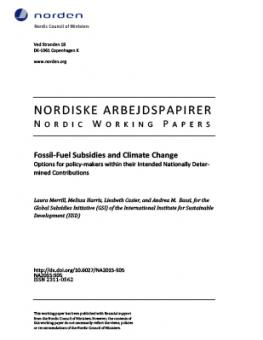
Fossil-Fuel Subsidies and Climate Change: Options for policy-makers within their Intended Nationally Determined Contributions
This paper reviews international models of fossil-fuel subsidy reform and greenhouse gas emissions to support parties to the United Nations Framework Convention for Climate Change.
Globally, the removal of subsidies to fossil fuels ($543 billion annually) can lead to global greenhouse gas emission reductions of between 6 and 13 per cent by 2050. The process unlocks domestic savings to governments of between 5 and 30 per cent of expenditure that could be reallocated to households and building a low-carbon energy future. In the context of a low oil price, many countries are phasing out such subsidies. Parties could include emission reductions from this policy tool, within their Intended Nationally Determined Contributions. This paper shows how parties could do that using the Global Subsidies Initiative – Integrated Fiscal model (GSI–IF model) to provide country estimates. For more information on country findings, please contact lmerrill@iisd.org.
You might also be interested in
The Cost of Fossil Fuel Reliance
Government support for fossil fuels reached at least USD 1.5 trillion in 2023, new data shows.
Increased Support Needed to Achieve India's Clean Energy Goals
India is on track to achieve many of its 2030 clean energy goals but needs to step up government support measures to accelerate the deployment of offshore wind, electric vehicles, and green hydrogen, according to a new report.
Ending Export Credits for Oil and Gas: How OECD countries can end 2024 with a climate win
For a year now, Organisation of Petroleum Exporting Countries (OECD) governments have been negotiating an agreement that could put an end to oil and gas export finance. Following the acrimony in Baku, this would be a very real way for the OECD to show policy coherence, respond to calls from the poorest countries to stop subsidizing fossil fuels, and shift public finance to solutions.
Fossil Fuel Production, Renewable Energy, and Subsidy Reform in Nationally Determined Contributions 3.0
This policy brief provides an analysis of the critical benchmarks and recommendations necessary for aligning nationally determined contributions (NDCs) with the 1.5 °C target.